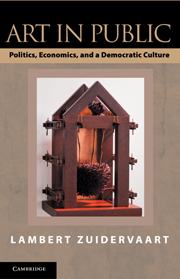2 - What Good Is Art?
Published online by Cambridge University Press: 05 June 2012
Summary
It is self-evident that nothing concerning art is self-evident anymore.
Theodor W. AdornoIn 1997 the National Endowment for the Arts released a report titled American Canvas. The report urges its readers to “support the vital part of government in ensuring that the arts play an increasing role in the lives and education of our citizens.” But the endless saga of NEA bashing, to which this report responds, raises a question it does not adequately address: “What precisely is the government’s proper part, and why is it vital?”
A quick answer might go like this: the arts play an important role in contemporary society; they cannot survive or thrive without government support; therefore, the government should give them the support they need. A moment’s reflection indicates why this quick answer will not do. It does not say what role the arts play in society and why that role is important. It does not establish why they cannot survive or thrive without government support. And it does not say why the government should be expected to give such support. Even the notion of “government support” is vague. Government support of the arts can take many forms: legislation and regulation (e.g., copyright law and regulations governing mass communication), state ownership and operation of arts-related ventures (e.g., national monuments and municipal museums), state-sponsored informational and educational services (e.g., tourism bureaus and arts education in schools), and state subsidies.
- Type
- Chapter
- Information
- Art in PublicPolitics, Economics, and a Democratic Culture, pp. 22 - 48Publisher: Cambridge University PressPrint publication year: 2010

